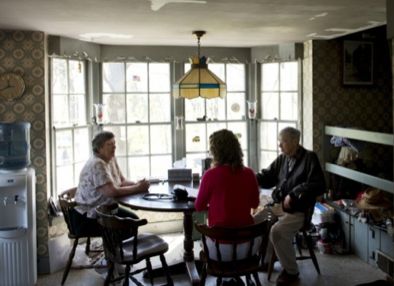More Bang for the Buck

The
biggest part of Medicare spending goes to patients who have several
chronic illnesses common to old age. But an innovative program tried out
in Doylestown, Pennsylvania, aims to help those patients stay out of
the hospital. 
Health Quality Partners is all about going there. The program enrolls Medicare patients with at least one chronic illness and one hospitalization in the past year. It then sends a trained nurse to see them every week, or every month, whether they’re healthy or sick. It sounds simple and, in a way, it is. But simple things can be revolutionary.Keeping elderly people out of hospitals by preventing complications increases lifespan and quality of life, besides saving money. But due to complicated reasons, Medicare may scuttle HQP completely. For one thing, it's hard to get the medical establishment behind such a simple program, because it cuts into profits.
Most care-management systems rely on nurses sitting in call centers, checking up on patients over the phone. That model has mostly been a failure. And while many health systems send a nurse regularly in the weeks or months after a serious hospitalization, few send one regularly to even seemingly healthy patients. This a radical redefinition of the health-care system’s role in the lives of the elderly. It redefines being old and chronically ill as a condition requiring professional medical management.
Health Quality Partners’ results have been extraordinary. According to an independent analysis by the consulting firm Mathematica, HQP has reduced hospitalizations by 33 percent and cut Medicare costs by 22 percent.
This, too, is a legacy of a health system built for acute care. Hospitals make money when they do more to patients. They lose money when their beds are empty. Put simply, Health Quality Partners makes hospitals lose money. “There’s no doubt that it’s a hit to the bottom line,” says Rich Reif, the former CEO of Doylestown Hospital, which worked with HQP.Read more about HQP at the Washington Post.

No comments:
Post a Comment